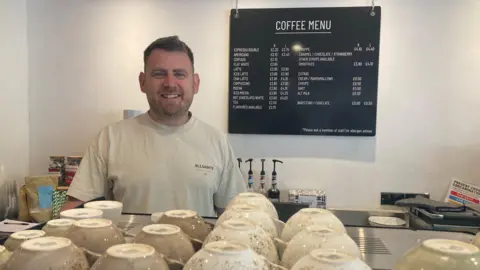In recent discussions surrounding payment methods among small businesses in Wiltshire, the endorsement for cash transactions has surfaced, particularly as local autonomy to accept cash remains unchanged for the time being. A significant advocacy comes from Bradley Buechel, a local entrepreneur who operates a coffee shop named the Nest in Chippenham, as well as a tyre business in Melksham. For him, cash transactions are not only commonplace but preferred, stating, “It’s perfectly fine for us. We encourage it.” His sentiment aligns with the broader concern that the declining acceptability of cash may adversely affect vulnerable demographics, stressing that cash-based transactions cater to those who may not have access to digital alternatives.
Highlighting the immediate benefits of cash, Buechel points out the absence of transaction fees associated with cash payments, which provides a more attractive financial framework for small businesses like his. He articulates this reality: “Cash is actually better because there is no transactional fee. On card you have to pay a processing fee and you have to wait.” He further emphasizes the societal significance of cash, reinforcing that the demand for it remains strong amid the increasing popularity of electronic payments. The ongoing trend of shifting towards cashless transactions indeed raises legitimate concerns about accessibility for segments of the population, especially when considering public services and local businesses that might not have the infrastructure to support digital payment methods.
The recent Treasury Committee report has added substance to this debate. Though it refrained from enforcing a legal obligation for businesses to accept cash payments, it underscored the necessity for improved governmental oversight regarding cash acceptance levels. The committee warned of potential exclusions for cash-dependent individuals when it comes to leisure activities, public transport, and other essential services. This report serves as a wake-up call highlighting that, without proper safeguards, the government may eventually need to intervene to ensure cash remains an available option for all.
Other local business owners echoed similar sentiments. Becky Lyons, who runs the Pawesome Pet Shop, acknowledged fluctuations in payment methods depending on the month, yet noted a discernible preference for card payments overall. However, she recognizes the utility of cash during electronic malfunctions, asserting, “I’ll accept any legal tender – I’m not going to tell people how to pay for their goods.” This blend of acceptance underscores a practical approach, allowing customers the flexibility they require.
Conversely, Richard Tidmarsh, who operates a recruitment agency along with a dog-walking business, indicates a minimal cash usage trend among his clientele, noting that cash is mainly reserved for dog-walking transactions. Still, he appreciates the versatility of both cash and digital methods, conveying that having systems in place for both options proves vital.
Meanwhile, regular consumers weigh in on their experiences; local residents Susan and Wayne Thirwell reveal their reduced reliance on cash, primarily using it for services like taxis and when tipping. Susan mentioned that utilizing cash can serve as a useful budgeting tool, further indicating that cash can be beneficial despite a digital income framework becoming predominant.
Ultimately, the pricing mechanisms, consumer preferences, and potential governmental regulations revolving around cash across businesses in Wiltshire create a complex narrative of transition from traditional to modern payment systems. The Treasury Committee’s latest report encapsulates the urgency of monitoring and reporting cash acceptance levels to mitigate future exclusion risks. This evolving story centers on a fundamental issue: balancing technological advancement with communal needs—an area where the voices of local small business owners and residents alike will remain pivotal.



